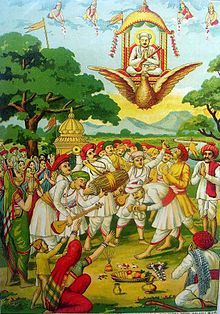Tukaram
Tukaram also Tuka (* 1608 also 1607 ; † 1649 ) was an Indian poet and Hindu mystic from the 17th century . He is considered a saint and is one of the spiritual representatives of the Marathas .
Life and teaching
The meaning of the name is not clear. The third syllable ram refers to the god Rama .
Tukaram comes from a grain merchant family, was a businessman and father. He was one of the lowest Shudra - caste to. He prayed to Vishnu not to be born again as an animal, because as an animal he could no longer ask to be born as a human. His merchant spirit turned into a lack of business skills and he turned to the bhakti (love of God). Tukaram left his family and lived in temples. After an unhappy second marriage, he turned to Hinduism and learned to read. He immersed himself in the Bhagavtupurana of the brahmin Marathi scholar Ekantha (1555-1599) and began to chant Abhangu - meter verses.
During a meditation he is said to have received the divine commission to write a million verses about God . He wrote 6,000 abhangas. His success sparked resentment among the Brahmins. Maranthe leader Sivaji invited him, but Tukaman rhymed a rejection. Sivaji had Tukaram handed a bowl of gold , which he distributed among the Brahmins present . His self-esteem turned to self-deification and he proclaimed that he was not only God , but even higher. After two hours of motionless ecstasy in Alandi , several birds landed on him, so that Tukaram became a meditating bird tree. In Indrayami he sat on the bank and sang his hymns and, according to tradition, mystically dissolved into light and air .
plant
Tukaram was an important representative of the Bhakti movement, whose highest goal is the love of God. He assumed that devotion to God alone sanctified people, but not belonging to a high caste . "Caste pride has never sanctified anyone, says Tuka, but the untouchables have crossed the ocean of life through devotion to God."
Others
The life of Tukaram was filmed in the historically significant Indian film Sant Tukaram (1936).
Individual evidence
- ↑ Axel Michaels: The Hinduism. History and present. CH Beck, Munich 1998, ISBN 3-406-44103-3 , p. 63.
- ^ RC Zaehner: The Hinduism. Its history and its teaching. W. Goldmann Verlag, Munich 1980, ISBN 3-442-39028-1 .
- ↑ a b c d e f Ulrich Holbein: Narratorium. 255 images of life. Ammann Verlag , Zurich 2008, ISBN 978-3-250-10523-7 . Pp. 938-941
- ^ RC Zaehner: The Hinduism. Its history and its teaching. W. Goldmann Verlag, Munich 1980, ISBN 3-442-39028-1 , p. 152.
| personal data | |
|---|---|
| SURNAME | Tukaram |
| BRIEF DESCRIPTION | Indian poet and mystic |
| DATE OF BIRTH | 1608 |
| DATE OF DEATH | 1649 |
